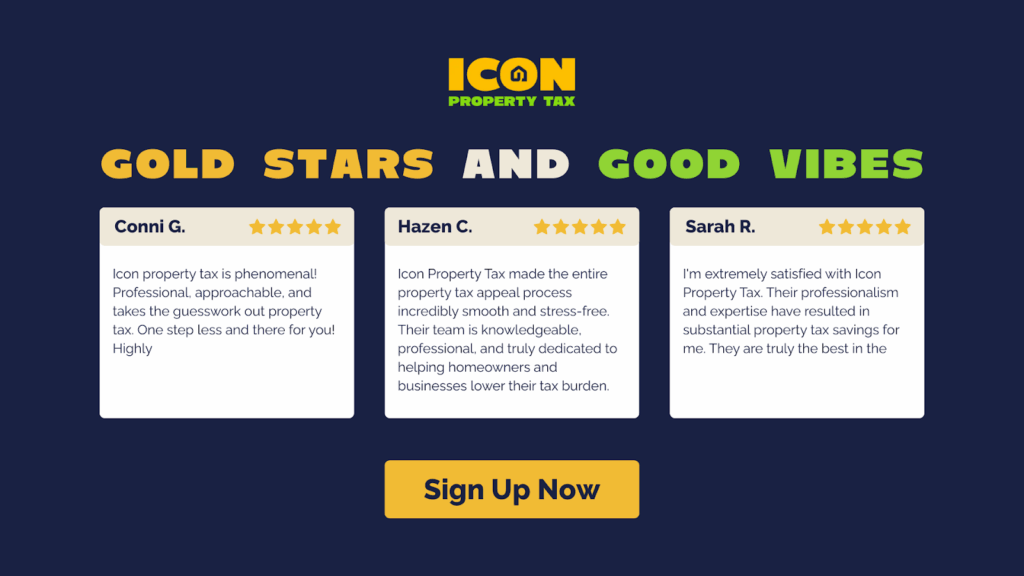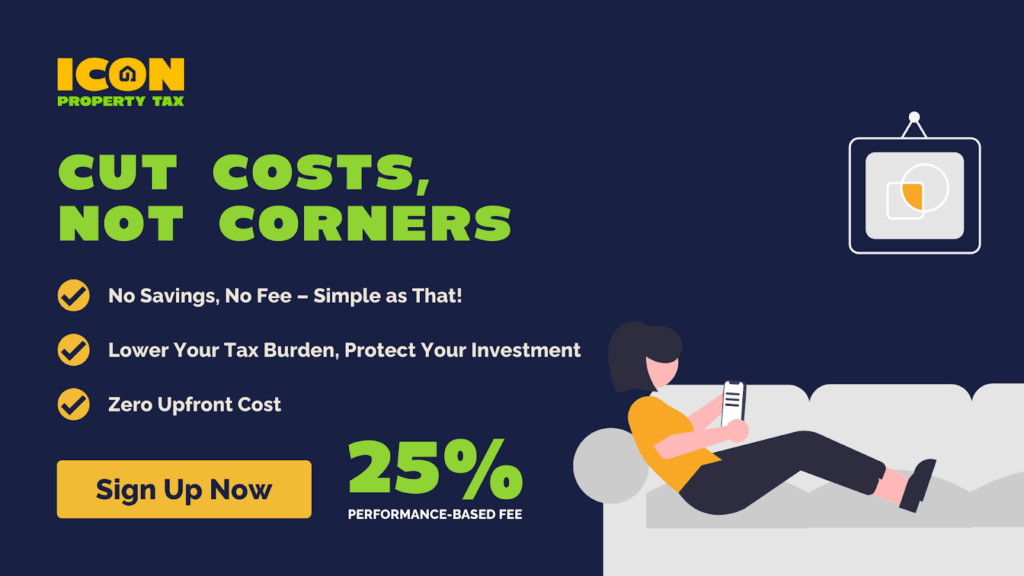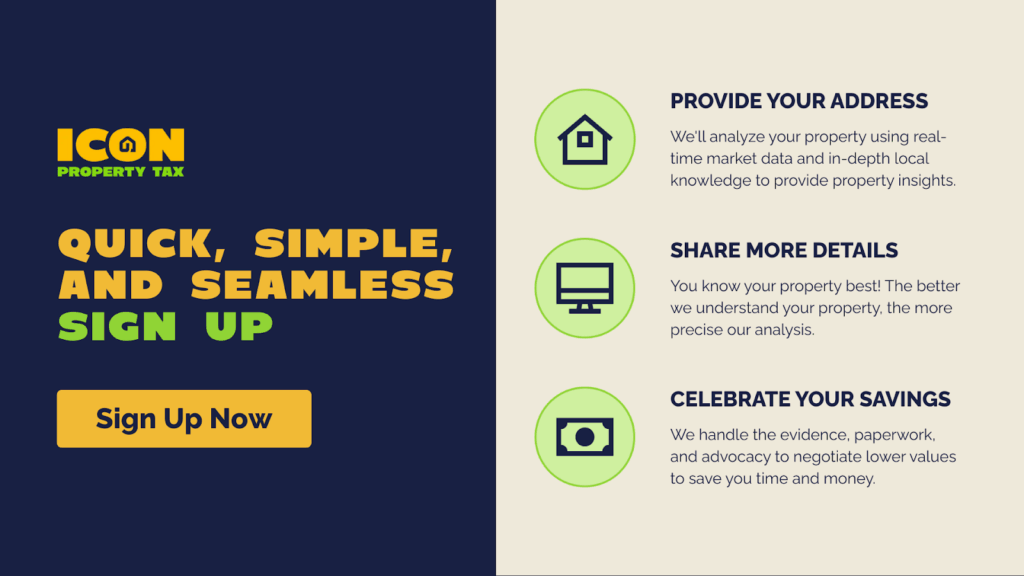Chicago Property Tax Overview: Rates, Assessments, And Billing Cycles
August 14, 2025
Key Takeaways:
- Assessment Impact: Your property tax bill is heavily influenced by the assessed value, which can be appealed if it’s inaccurate.
- Billing Structure: Cook County’s tax cycle includes two installments, with the second reflecting actual rates and reassessments.
- Savings Opportunity: Icon helps property owners lower taxes through appeals; there’s no fee unless you save.
Chicago’s property tax system is layered, inconsistent, and often misunderstood. Rates vary from year to year, assessments can spike without a clear explanation, and billing cycles don’t always align with what property owners expect. These moving parts create an environment where mistakes go unnoticed, and property owners overpay quietly. If you don’t know how the system works, you could be funding more than your fair share of the city’s budget.
At Icon, we’ve helped property owners in Chicago and across Cook County save millions in property tax overpayments, without charging a dime upfront. Our in-house team of attorneys, analysts, and support staff is focused on one thing: making sure your property is fairly assessed, and your tax bill isn’t a penny more than it should be.
In this piece, we will be discussing how Chicago property taxes are calculated, what goes into assessments, how billing cycles work, and what you can do to reduce your tax burden.
Understanding Chicago Property Tax
Property taxes in Chicago are a key part of how the city funds essential public services like schools, public safety, and infrastructure. If you own real estate in Cook County, your annual property tax bill is not just a routine cost; it’s a direct link to how your community operates and develops.
In Chicago, property taxes are calculated based on the assessed value of your property and the local tax rate. These taxes are managed by a range of public offices, including the Cook County Assessor, the Cook County Treasurer, and the Cook County Board of Review. Each plays a different role in the overall process of valuation, billing, and appeals.
The complexity of Chicago’s tax system often catches property owners off guard, especially when assessments increase unexpectedly or tax bills don’t align with a property’s market value. That’s why understanding how the system works can make a real difference when it comes to protecting your investment and planning for the future.

How Property Tax Rates Are Determined
Chicago property tax rates are influenced by a combination of local government budgets, state laws, and property assessments. The process may seem complicated, but it follows a set structure that determines how much each property owner is expected to contribute.
First, each taxing body, such as school districts, city services, and park districts, sets its annual budget. These budgets determine how much revenue needs to be raised through property taxes. Once those needs are defined, the total amount is divided among all properties in the area based on their assessed value.
The key formula looks like this:
Assessed Value × Equalization Factor × Tax Rate = Property Tax Bill
Cook County uses an assessment level of 10% for residential properties and 25% for commercial properties. The state equalization factor is then applied to bring assessments in line with market value. Finally, the local tax rate, determined by the budget needs of each taxing body, is applied to calculate your final bill.
Because tax rates are tied to budget decisions, even if your property value remains the same, your tax bill can rise. This unpredictability highlights why many Chicago property owners seek to reduce their assessments when possible.
If you believe your assessed value is too high, you’re not alone. That’s where we come in. At Icon, we specialize in reviewing property assessments and pursuing reductions when appropriate. Lower your tax burden and protect your investment; you only pay if we save you money.
Property Assessments In Chicago
The property assessment is the foundation of your tax bill in Chicago. It determines how much of the total tax levy you’ll be responsible for. In Cook County, the Assessor’s Office assigns a value to each property based on a percentage of its estimated market value; this is known as the assessed value.
For residential properties, the assessment ratio is 10%. For commercial properties, it’s 25%. However, assessments aren’t updated annually for all properties. Instead, Cook County uses a triennial reassessment system, which means your property is reassessed once every three years, depending on your location within the county.
During reassessment years, the Assessor considers various factors like recent sales, property characteristics, location, and income (for income-producing properties). But mistakes and overvaluations can happen. That’s why it’s essential to review your property’s assessment closely, especially if your bill jumps unexpectedly.
If your assessment seems inaccurate, you have the right to appeal. At Icon, we’ve helped thousands of property owners challenge inflated assessments. No savings, no fee, it’s that simple. We do the heavy lifting, and you only pay when we succeed in lowering your taxes.
Billing Cycles And Payment Schedules
Understanding when property taxes are billed and due in Chicago can help you avoid surprises and penalties. Property taxes in Cook County are billed in two installments:
- First Installment: This bill is usually due in March and is automatically calculated as 55% of the previous year’s total tax bill. It does not reflect any changes in assessments or rates.
- Second Installment: This bill accounts for reassessments, updated tax rates, and budget changes. It’s typically due in the summer or early fall, though delays can occur. This installment reflects the final amount owed for the tax year.
Tax bills are sent by the Cook County Treasurer’s Office, and payment can be made online, by mail, or in person. If payments are late, interest is applied monthly, and prolonged non-payment can lead to a tax sale, where your unpaid taxes are sold to investors.
To stay ahead of billing surprises, property owners should monitor reassessments and appeal high valuations when needed. Even one successful appeal can lead to years of savings. Work with Icon to take control of your tax bill. Our clients benefit from local expertise and zero upfront cost.

How To Reduce Your Property Tax Burden
If your property taxes feel unreasonably high, you’re not alone. Many Chicago property owners are paying more than they should, simply because they don’t know where to start. Here’s how you can take control:
File A Property Tax Appeal
One of the most effective ways to lower your tax bill is to appeal your assessment. If your property’s assessed value is higher than it should be, you’re paying more than your fair share. A successful appeal can bring that value down, reducing your overall tax obligation for the year.
Review Your Property Record For Errors
The Assessor’s Office maintains property records that include details like square footage, number of bedrooms, and lot size. Errors in these records, such as overestimating your home’s size, can inflate your assessed value. Identifying and correcting these mistakes is a simple yet powerful way to protect your wallet.
Apply For Available Exemptions
Cook County offers several exemptions that directly reduce the taxable value of your home, including the Homeowner, Senior Citizen, and Disabled Person exemptions. These can lead to hundreds or even thousands in annual tax savings. The application process is straightforward, but deadlines and eligibility requirements must be met.
Hire A Property Tax Professional
The appeal process isn’t always intuitive, especially when dealing with commercial or multi-unit properties. Working with a team like Icon gives you the advantage of data-driven analysis, years of experience, and a local understanding of Cook County’s assessment process. No savings, no fee, it’s that simple.
Act Within Appeal Deadlines
Timing is critical when it comes to appealing your property taxes. Each township has a limited filing window; miss it, and you may be stuck with your current assessment for another year. Setting calendar reminders or working with a service that tracks these dates for you can save you from missing valuable opportunities.
Why Work With Icon
At Icon, we specialize in one thing: lowering property tax bills for property owners across Chicago and Cook County. Navigating the complex web of assessments, exemptions, deadlines, and appeals can be overwhelming. Our team brings clarity, accuracy, and results to a process that often feels stacked against you.
We analyze your property’s assessment using local market data and identify opportunities to challenge overvaluations. From filing appeals to representing you throughout the review process, we handle every step. Most importantly, you don’t pay anything unless we successfully reduce your tax burden.
Icon’s No-Savings, No-Fee Pledge ensures you’re never at risk; we only succeed when you do. Whether you own a single-family home, commercial property, or multiple parcels, our team treats your property like it’s our own. Join thousands of satisfied clients who trust Icon to protect their investments and deliver meaningful savings.

Final Thoughts
Understanding the Chicago property tax system can feel like decoding a complicated formula, but it’s worth the effort. Between fluctuating tax rates, shifting assessments, and unpredictable billing cycles, even informed property owners can find themselves overpaying. That’s why staying informed and acting early is crucial.
At Icon, our goal is simple: help you pay only what’s fair. Whether you’re reviewing your latest assessment, preparing to file an appeal, or just trying to make sense of your tax bill, we’re here to help. Lower your tax burden and protect your investment, and remember, you don’t pay unless we save you money.
Read Also:
- DuPage County Property Tax Overview: Rates, Assessments, and Billing Cycles
- Kane County Property Tax Overview: Rates, Assessments, And Billing Cycles
- Will County Property Tax Overview: Rates, Assessments, And Billing Cycles
Frequently Asked Questions About Chicago Property Tax
What happens if I don’t pay my Chicago property taxes on time?
Late payments accrue interest at 1.5% per month in Cook County. Continued non-payment can lead to a tax sale, where your delinquent taxes are sold to a third party, potentially putting your ownership at risk.
Can property taxes in Chicago decrease on their own without an appeal?
While it’s possible during a reassessment year if the market value drops, decreases without an appeal are rare. Most reductions come from proactive appeals or exemption applications.
Is it possible to estimate future property tax increases?
Future increases depend on many variables, like local budget changes, assessment shifts, and policy updates, making it difficult to accurately predict future bills without detailed modeling.
Do property improvements increase my tax bill?
Yes. Major renovations, additions, or upgrades can increase your property’s assessed value, which may result in a higher tax bill in the next assessment cycle.
Can I appeal my taxes every year?
Yes. Many property owners review and appeal annually, even during non-reassessment years. You don’t have to wait for a reassessment to file an appeal.
How does the Assessor determine market value?
The Assessor uses sales data, property characteristics, and neighborhood trends to estimate what your property would sell for under normal market conditions.
Are there tax relief options for landlords in Chicago?
Landlords may be eligible for certain exemptions or reassessment strategies, especially if their property includes affordable housing or falls under specific incentive programs.
How long does the appeal process take in Cook County?
An appeal can take several months, depending on the level of review (Assessor, Board of Review, or Property Tax Appeal Board) and the time of year you file.
Can I appeal on my own, or do I need professional help?
You can appeal on your own, but the process requires strong supporting evidence and strict adherence to deadlines. Many property owners choose professionals like Icon to maximize their chances of success.
What are common mistakes people make during the appeal process?
Common mistakes include missing deadlines, submitting incomplete evidence, misunderstanding valuation methods, or failing to include recent comparable property sales.

